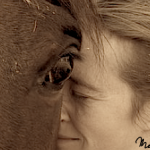The <3 of a Horse (part 1)
| June 2, 2023 | Posted by Melinda under Uncategorized |
Recently I spent a lot of time writing and explaining horse hearts because of a case I helped with. It seems a shame to let all those words go to waste, so with a few changes and revisions I’ve decided to share a version of all that explaining here on the blog.
Interlude: I guess this is where I should insert some cutesy anecdote or quip about the heart of a horse both spiritually and athletically….
…but the title of the post is all I have in me. You are welcome.
Part 1. Stethoscope Time
When we listen to a horse’s heart with a stethoscope we hear the sounds of the heart as it moves through its cycle of fill and pump, and paying attention to the rhythm of that cycle.
The heart has a rhythm, like a ticking clock. Lub-dub *pause* Lub-dub *pause* Lub-dub *pause*
When the ticking isnt’t regular, that’s called an arrhythmia.
Key point: Arrhythmias can be harmless, or not.
There are two common arrhythmias that I hear in vetmed.
#1: A gradual slowing and speeding up of heart rate in timing with breathing is really common (sinus arrhythmia). It has to do with the pressure in the chest changing as you breathe in and out and the how it affects the compression of the big vessel in the chest returning blood to the heart.
#2: In really fit horses at rest there is often “dropped” beat. The heart is ticking away when suddenly there is a long pause….and then tick tick tick off it goes again. There’s usually a rhythm to this where the dropped beat comes at predictable intervals. The fancy speak word for this is a “2nd-degree-atrio-ventricular block.” It will disappear with exercise.
If the arrhythmia is one of these two, I shrug shoulders and go “meh.” Any other rhythm weirdness get a recommendation for a cardio consult.
Why? Because while the heart of a horse is kind and giving (and sometimes witchy and opinionated. Can you tell I mostly have old mares in my life?), it is also in the body an animal that weights half a ton.
Key Point: Unlike dogs and other smaller animals, anything funky going on with the heart of a horse is a safety concern for the humans. A “sudden cardiac event” is no fun for anyone, but especially if you are next to or on top of a 1,000-pound animal that could invite the squishy human to the crisis party.
The other abnormality that gets your an automatic RSVP to the cardio consult party is a heart making abnormal sounds.
The normal sounds of the horse heart (lub-dub *silent pause* lub-dub *silent-pause*) are the sounds of heart valves opening and closing securely in cycles, with an orderly flow of blood through those gates.
Think about a garden hose. When the valve is open all the way, the flow of the water is quiet. When the valve is completely closed, it is also quiet. Anything in between causes hissing, spitting, or whooshing noises.
Blood moves through the heart and is squeezed through one chamber to the next through valves/gates that are opening and closing. When the heart is working normally it’s like a silent garden hose where the water is on or off, and the lub-dub sounds you hear are simply the gates/valves being turned on and off with no water escaping when it shouldn’t.
When it escapes, there is noise where there should be silence.
Lub-dub *whoosh* Lub-dub *whoosh*.
Lub-whoosh-dub *silent pause* Lub-whoosh-dub *silent pause*
*Blood is squeezing through gates that should be closed and creating sound where there should be silence. This is what we call a murmur.
*there are other causes of murmurs, but if you are interested in the details and specifics beyond my “let’s not get bogged down in a million details” post here, there’s a ton of great articles on the web to go down deep rabbit holes.
There’s a whole grading system for the intensity of a murmur, words to describe the timing of the murmur, and even more creative names for the pitch of the sound (dive bomber, washing machine, musical…). But, when you hear a murmur (especially in a horse), the important thing to remember is…..
Key point: The intensity or loudness of the murmur canNOT predict how “bad” or whether it’s benign. Get thee to a cardiologist!
That’s exactly what we did for the case of the old mare that inspired this post, who we will call “Applecakes”, who had a LOUD lub-dub *whoosh* lib-dub “dive-bomber” murmur that radiated over most of her chest that was found incidentally when we were working her up for a different medical issue.
Part 2 coming soon…
For amusement while waiting:
Just a reminder that the information you read here is not medical advice, even though yes – I am a medical professional. This is for informational purposes only. There’s a whole lot of information about this subject available elsewhere if you decide to jump into the google rabbit hole instead of just peer inside.











